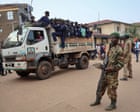
In a promising development towards resolving longstanding conflicts, Rwanda and the Democratic Republic of the Congo (DRC) have formalized a peace agreement during a ceremony in Washington, D.C. This milestone, brokered with the involvement of US officials, aims to mitigate the persistent hostilities in the eastern region of the DRC. Despite this significant step forward, the agreement has been met with mixed reactions as questions about its effectiveness and the transparency of its terms arise.
Hosted by US Secretary of State Marco Rubio, the signing event was notable for the active participation of former US President Donald Trump, who underscored the economic advantages the deal could yield, particularly regarding mineral rights. The agreement stipulated the withdrawal of Rwandan troops from eastern Congo within 90 days, aligning with a framework established in a 2024 pact.
International observers and critics, however, have raised concerns about the lack of detailed provisions within the agreement. The accord’s opacity leaves many questioning who the primary beneficiaries will be and whether it genuinely addresses the underlying issues that have fueled conflict in the region since the 1994 Rwandan genocide.
Turning to another part of the globe, developments in Eastern Europe have also drawn attention. The recent advance of Russian forces into Ukraine has prompted Ukrainian President Volodymyr Zelensky to sign a decree withdrawing Ukraine from the Ottawa Convention, an accord aimed at prohibiting anti-personnel mines. This move signals a strategic response to the evolving military challenges Ukraine faces, reflecting a broader regional tension that impacts neighboring countries contemplating similar decisions.
In the Middle East, sentiments of resilience and a desire for peace resonate strongly among Israeli citizens returning home. On a cruise liner traveling from Cyprus to Israel, many passengers expressed their nuanced perspectives on the ongoing “Twelve-Day War” and the turmoil in Gaza. Stemming from the tragic events of October 7, these individuals shared a collective longing for peace, albeit with an acknowledgment of the complexities surrounding their nation’s security measures.
Each of these narratives underscores the intricate web of challenges and aspirations shared by nations pursuing stability and economic prosperity. As Rwanda and the DRC strive for peace, the international community observes keenly, hopeful that these agreements will pave the way toward lasting tranquility. Similarly, Ukrainians and Israelis grapple with their unique contexts, seeking pathways to harmony and security amid fluctuating geopolitical landscapes.
The current landscape reflects the broader, interconnected nature of global peace efforts, reminding us of the delicate balance required to foster cooperative and peaceful coexistence among nations. The road ahead will demand continued dialogue, empathy, and innovative solutions that prioritize the well-being and aspirations of people across regions.
Source: {link}
